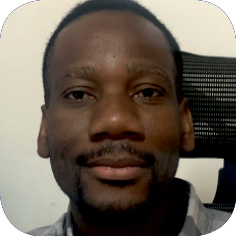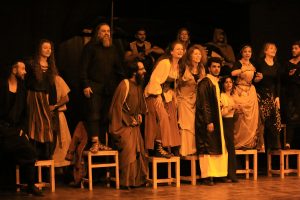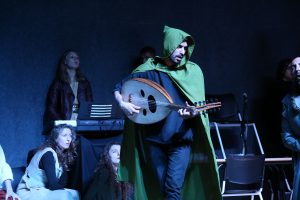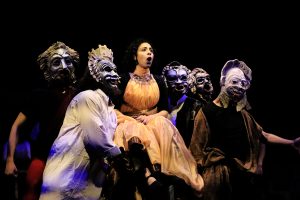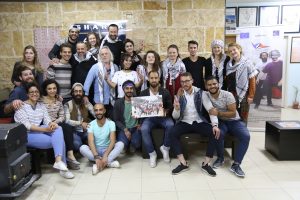Think of anything an accomplished musician can do – write songs, sing, and produce – and you will find that Ahmad Sharabati genuinely fits the description. That may sound ordinary for anyone who is into music, but Ahmad’s unique attribute is that he taught himself to do all three.
Ahmad Sharabati, a Palestinian singer, songwriter, and producer, is trying to transform the Palestinian music scene. He hails from Hebron – a politically segregated city – and one would expect him to write protest songs or hold rousing concerts to draw attention to the oppressive conditions of his city. Instead, the soft-spoken multi-talented musician raises his voice in quite a different way and in so doing has achieved great things by trying to bridge cultural gaps using music. The four duet music videos that are currently in the works with Polish singer Magdelana Pamula and a 15-track solo album are a testament to his mission.
The 25-year-old musician’s collaboration with Pamula on their upcoming video project is thanks to an initiative dubbed “United beyond Borders,” launched by the European Union and implemented by Sharek Youth Forum 2019. It aims to support intercultural exchanges and awareness-raising about Palestinian culture.
Ahmad and Magdalena’s exciting yet-to-be released music video in the form of “Ma Anti” has a vocal duet. The video encapsulates everything about Ahmad’s values, culture, and purpose in a powerful message. His style and genre encompass the traditional oud, epic vocals, haunting, dreamlike melodies, and celestial drops.
Ahmad explains that the collaboration is about bringing different cultures together: “In the beginning everything about Polish and Palestinian music pointed towards differences in cultures. The style and genre were totally different, lacking any similarities whatsoever. But then we worked and focused on finding something special that would link the two cultures, and we managed, finally, to do that.”
“By evoking emotions with music, the collaboration brought the two cultures closer and connected them,” states Ahmad. This is evident in both the music and the music video, which, according to Ahmad, is about three imaginary characters – a young man who speaks only Arabic, a young woman who speaks only Polish, and the oud. The oud is the central character in the music and plays the role of facilitator. “It interprets the messages conveyed between the man and the woman,” explains Ahmad. “Similarly, the video content has the same plot. The man and woman don’t see eye to eye. They don’t agree on much. But the sequence of the chords creates a melody that facilitates the task of blending the two together.”
Ahmad has no intention of bringing this project to an end. The experience has helped to confirm the role of music in augmenting cultural relationships. He has since founded a music group called Meem and created a café in Hebron as a space for people who want to learn music, theater, and drama. He spends at least two hours a day teaching music at seven of Hebron’s private primary schools and to people living in the outlying areas of Hebron.
Ahmad has also ventured into theater. His role has been to create new tunes and vibes for the plays. “These workshops have expanded my knowledge, horizons, and worldview and, more importantly, they have opened more opportunities for me,” he explains. “This has had a positive effect on me, and I have started new initiatives in performing and scenic arts. In addition, I have become more courageous in voicing my feelings rather than sticking to traditional Arabic and classical music. Because of this experience I have become more aware of the needs and challenges within my community.”
Through his music, Ahmad has reached out to about 2,000 children. He tries to creatively engage each and every child no matter how much or how little experience they have with music.
“Since I started to work with children, I have become more creative and have devised a pedagogical methodology. I learn a lot from them,” said Ahmad who prefers to be called a musician. Through fun games, challenges, and activities, children learn to connect with a variety of musical styles and expand their knowledge and appreciation of music. For Ahmad, this is a huge success.
His work with children is influenced by how he grew up. “We live in a traditional and closed society where people are not usually allowed to play music. Young people prefer to go into other fields and professions instead of music. I didn’t have a head start. I didn’t have a mentor when I started learning to play instruments at the age of nine. Family and society threw spanners into the works.”
Article photos courtesy of the author.

